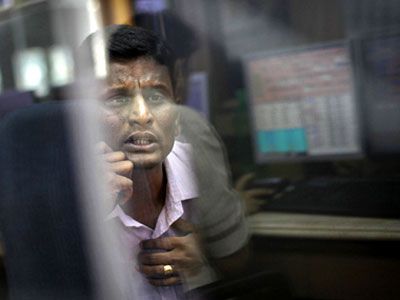The India growth story is still intact, and fall in the Indian stock markets is an imported one and if the government succeeds in legislating the GST and Land Bill, India could yet emerge as a winner believe stock market experts
 Both the Bombay Stock Exchange and the National Stock Exchange have been in a tailspin in the New Year closely following the collapse in the Chinese markets. As the Shanghai Composite Index cracked 7 per cent Thursday morning, after the People’s Bank of China cut its reference rate by 0.5 per cent, the Chinese stock market was shuttered second time for trade this week. The panic that followed has shaved off almost $2.5 trillion in global investors’ wealth as crude prices tumbled to a 12-year low and commodities crashed all across.
Both the Bombay Stock Exchange and the National Stock Exchange have been in a tailspin in the New Year closely following the collapse in the Chinese markets. As the Shanghai Composite Index cracked 7 per cent Thursday morning, after the People’s Bank of China cut its reference rate by 0.5 per cent, the Chinese stock market was shuttered second time for trade this week. The panic that followed has shaved off almost $2.5 trillion in global investors’ wealth as crude prices tumbled to a 12-year low and commodities crashed all across.
To put on record, the NSE Nifty 50 futures have crashed almost 400 points since January 1, tanking almost 2.5 per cent on January 7.
“If there is fire somewhere we will definitely feel the heat,” says Ambareesh Baliga, an independent market analyst. “In the past it was Greece, today, it is China,” he adds blaming the crash on the Chinese economy.
“This is nothing but imported carnage, we don’t have our problem. Such sharp drops only indicate lack of confidence of market participants,” says S P Tulsian, another independent analyst.
Tulsian blames the current meltdown in the Indian markets on the futures and options trading. “The F&O is converting investors into traders,” he says referring to the increase in lot sizes of most top traded companies.
Tulsian believes this increase in lot sizes is the root cause of the crashes we have witnessed in the New Year.
Tulsian points out that in the last three months the mid-cap sector has given fabulous returns. “But who is tracking the mid-cap index?” he asks.
Deven Choksey of K R Choksey agrees with Tulsian that it is the lack of investors’ confidence that is responsible for the current market turmoil. “FII flow is not coming due to their own problems; they are cutting their losses in oil, commodities and currencies and hence are booking profits in the Indian markets,” he says.
India positive
However, all the three stock market mavens believe that this weakness will subside in a week or two and then if the Narendra Modi government succeeds in passing the Goods and Services Tax bill and land bill into laws, then market confidence will get a boost.
“FII money has to come to India. Which other economy promises growth opportunities in this dim scenario?” he asks.
Baliga is betting on the fact that India still remains a consumption story and unlike China, where growth had been fuelled by exports, India doesn’t have too much to worry to drive growth.
“There is a positive side to what’s happening in China. The commodities prices are low, crude and metals prices are low and India is on an asset building mode,” says Baliga explaining why he thinks that India will soar even in these gloomy global economic conditions.
According to Baliga the Chinese contagion is the result of too much capacity building by the Chinese and a simultaneous drop in domestic as well as global demand.
Baliga believes given the bold reform outlook for India, sectors like power and power ancillaries, banking, and auto could emerge winners for investors with a long-term horizon.
While Tulsian is looking out at stocks like Maruti, Baer Crop Science, Century Textiles, Wockhardt and Ultra Tech Cements (Disclosure: S P Tulsian has interest in most of these stocks and has even advised his clients to buy these stocks), Choksey is broadly looking at auto, select banking and non-banking, financials, capital goods and stocks in the infrastructure space.
Ask Choksey to look at the crystal ball and he says, “Investors should watch out for the three Cs in 2016: crude, commodities and currencies.








